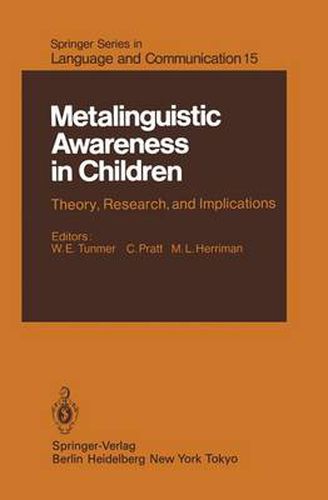Readings Newsletter
Become a Readings Member to make your shopping experience even easier.
Sign in or sign up for free!
You’re not far away from qualifying for FREE standard shipping within Australia
You’ve qualified for FREE standard shipping within Australia
The cart is loading…






This title is printed to order. This book may have been self-published. If so, we cannot guarantee the quality of the content. In the main most books will have gone through the editing process however some may not. We therefore suggest that you be aware of this before ordering this book. If in doubt check either the author or publisher’s details as we are unable to accept any returns unless they are faulty. Please contact us if you have any questions.
In the past fi fteen years there has been a growi ng interest in the development of children’s awareness of language as an object in itself – a phenomenon now generally referred to as metal inguistic awareness. Until the publication of an earlier volume in the Springer Series in Language and Communication, The Chitd’s Conoeption oi Language, edited by A. Sinclair, R. J. Jarvella, and W. J. M. Levelt, there had been no systematic treatment of metalinguistic awareness. The major goal of that volume was to map out the field of study by describing the phenomenon of interest and defining major theoretical issues. The aim of the present volume is to present an overview of metalinguistic awareness in children which reflects the current state of research and theory. The volume is divided into three major sections. The first considers various conceptual and methodological issues that have arisen from efforts to study metalinguistic awareness. It addresses such questions as what is metalinguistic awareness, when does it begin to emerge, and what tasks and procedures can be employed to assess its development in young children. The second sect ion cri ti ca 11y revi ews the research that has been conducted i nto the four general types of metalinguistic awareness – phonologieal, word, syntactic, and pragmatic awareness. In the final section the development of metalinguistic awareness is examined in relation to general cognitive development, reading acquisition, bilingualism, and early childhood education.
$9.00 standard shipping within Australia
FREE standard shipping within Australia for orders over $100.00
Express & International shipping calculated at checkout
Stock availability can be subject to change without notice. We recommend calling the shop or contacting our online team to check availability of low stock items. Please see our Shopping Online page for more details.
This title is printed to order. This book may have been self-published. If so, we cannot guarantee the quality of the content. In the main most books will have gone through the editing process however some may not. We therefore suggest that you be aware of this before ordering this book. If in doubt check either the author or publisher’s details as we are unable to accept any returns unless they are faulty. Please contact us if you have any questions.
In the past fi fteen years there has been a growi ng interest in the development of children’s awareness of language as an object in itself – a phenomenon now generally referred to as metal inguistic awareness. Until the publication of an earlier volume in the Springer Series in Language and Communication, The Chitd’s Conoeption oi Language, edited by A. Sinclair, R. J. Jarvella, and W. J. M. Levelt, there had been no systematic treatment of metalinguistic awareness. The major goal of that volume was to map out the field of study by describing the phenomenon of interest and defining major theoretical issues. The aim of the present volume is to present an overview of metalinguistic awareness in children which reflects the current state of research and theory. The volume is divided into three major sections. The first considers various conceptual and methodological issues that have arisen from efforts to study metalinguistic awareness. It addresses such questions as what is metalinguistic awareness, when does it begin to emerge, and what tasks and procedures can be employed to assess its development in young children. The second sect ion cri ti ca 11y revi ews the research that has been conducted i nto the four general types of metalinguistic awareness – phonologieal, word, syntactic, and pragmatic awareness. In the final section the development of metalinguistic awareness is examined in relation to general cognitive development, reading acquisition, bilingualism, and early childhood education.